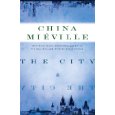More on the Conspiracy Plot
Last week I posted my reaction to Lev Grossman’s “Good Books Don’t Have to Be Hard” essay in The Wall Street Journal. Here’s a more detailed analysis, courtesy of The Mumpsimus. Here also is Michael Agger’s take on Grossman’s own plotting in the Sunday New York Times Book Review.
On another note, I just finished China Miéville’s The City and the City. Intriguing premise — and something quite different from his previous work, which is always good to see in a favorite novelist — where two presumably East European cities somehow physically co-exist, with the inhabitants following strict protocols to avoid one another whenever their separate realities intersect. Grossman would be happy that it has compelling plotting; however, as a “police procedural,” Miéville doesn’t quite play fair. Part of the game in these kind of things is to at least give the reader a chance of figuring out the mystery of “whodunnit,” which I doubt anyone would be able to, although I’m guessing this isn’t Miéville’s concern here. I think he’s aiming at something more metaphorical along the lines of the existential spaces we all tread among the various realms of social interaction. Nonetheless, the unfolding of the mystery struck me as a little forced. Potentially, this could be the start of a series.
Intriguing premise — and something quite different from his previous work, which is always good to see in a favorite novelist — where two presumably East European cities somehow physically co-exist, with the inhabitants following strict protocols to avoid one another whenever their separate realities intersect. Grossman would be happy that it has compelling plotting; however, as a “police procedural,” Miéville doesn’t quite play fair. Part of the game in these kind of things is to at least give the reader a chance of figuring out the mystery of “whodunnit,” which I doubt anyone would be able to, although I’m guessing this isn’t Miéville’s concern here. I think he’s aiming at something more metaphorical along the lines of the existential spaces we all tread among the various realms of social interaction. Nonetheless, the unfolding of the mystery struck me as a little forced. Potentially, this could be the start of a series.
Interesting that Thomas Pynchon’s latest is also a noir detective novel that people might actually read, if only because its less than opus-length. However, while the detective novel form might be a way to introduce new readers to Pynchon, I don’t think I’d pick The City and The City to introduce folks to Miéville. That would probably be Perdido Street Station.